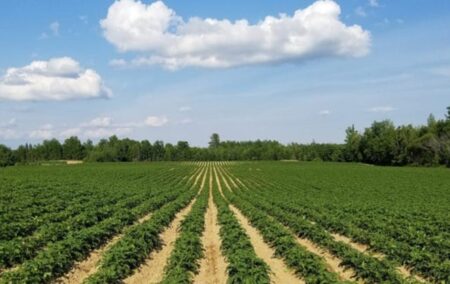Land reform, says President Cyril Ramaphosa as well as many of his colleagues in the African National Congress and the government, is an absolute priority. It has become the issue in which South Africa will stand or fall – a matter of moral urgency and economic necessity.
For this reason, not only is government forging ahead with accelerated land reform through Expropriation without Compensation (EWC), but it is also going to bring about a veritable agrarian revolution through appropriate support.
Heady rhetoric aside, the budget paints a very different picture. In keeping with what has been a trend since the 1990s, land matters receive a tiny share of state outlays, with no prospects of meaningful increases over the coming few years.
In the coming financial year, the government envisages total, ‘consolidated’ spending around R1.8 trillion. Of this amount, the Department of Agriculture, Land Reform and Rural Development – an amalgam of the former Departments of Rural Development and Land Reform and Agriculture, Forestry and Fisheries – will receive some R16.8 billion. This amounts to a paltry 0.86% of the total.
Slight drop
In proportional terms, this actually represents a slight drop compared to the cumulative spending by the two antecedent departments, which came in at a shade under 1% of the total.
Over the succeeding two years, departmental spending will rise somewhat – to R17.9 billion in 2021/22 and 16.5 billion in 2022/23 – although, as a proportion of consolidated spending, it will remain essentially constant.
Even if a more generous frame of reference is used – the so-called ‘functional classification’ of the budgetary expenditure, in other words, everything connected with land and agriculture – outlays for 2020/21 come to R28.3 billion, or 1.5% of consolidated spending. This ticks up over the next two years, reaching R30.7 billion in 2022/23 (when it will amount to 1.4% of consolidated spending).
Even from this perspective, land spending remains a minor entry.
It might be argued that the lack of budget for land matters conveys the intent – when EWC is on the books – to take a great deal more without paying for it. There may well be truth in this. Although even while dispensing with compensation, a proper land reform programme would need to be buttressed by a suitably skilled administration and plentiful financing, especially since EWC would destroy much of the collateral value of land.
A good measure of the latter is the funding provided to ‘farmer support and development’. At some R4.1 billion in the current year, it accounts for some 0.2% of consolidated spending. In two years, the figure will reach R4.5 billion, accounting for the same proportion of spending.
This is trivial when set against the financing requirements of the farming economy – a figure of some R180 billion has been mentioned by the CEO of the Banking Association of South Africa, Cas Coovadia.
In other words, promises and pledges notwithstanding, there is no realistic or realisable commitment of resources to provide the sort of backing that would enable a successful land reform or agrarian development strategy. It is an illusion.
This does, not, however, mean that the EWC drive is all for show. It remains a very real danger to every property holder and aspirant property holder in the country.
Ideological impulses
We at the IRR have long argued that this policy is not driven by land reform per se, but by ideology. The reconfiguration of property ownership (from present owners to the state) would satisfy some deep ideological impulses, and constitute a step towards the building of a socialist economy. That this is unlikely to work out is beside the point – the determination to keep loss-making state-owned enterprises afloat should be warning enough of that.
Besides, the danger of EWC as a policy is not only in the imminent threat to any asset, but in the considerable enhancement of state power and latitude that it would imply. Assets that might be secure under today’s government, might not be secure under tomorrow’s.
Serious and successful land reform, meanwhile, remains in practical terms as much of a backwater as ever it was.
If you like what you have just read, become a Friend of the IRR if you aren’t already one by SMSing your name to 32823 or clicking here. Each SMS costs R1. Terms & Conditions Apply.

